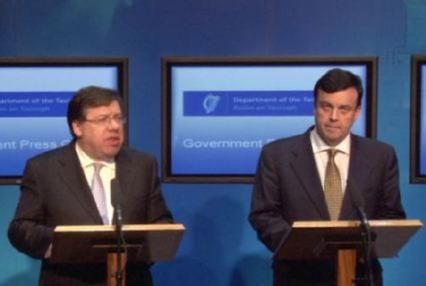A six-step political alternative

Public anger is growing. Three austerity budgets and the banking guarantee have deepened rather than resolved the economic crisis. And now, in defiance of all the evidence the government is going to continue with these failed policies with more vigor and determination that ever before.
The four-year plan and Budget 2011 will push thousands of families into poverty. It will deflate the economy, force more people out of work and do nothing to reduce the deficit.
The EU/IMF bailout will see the disastrous banking guarantee continue with the taxpayer once again paying the bill for the high-risk investments of the bondholders.
Meanwhile Fianna Fail clings to power, despite having no mandate to do so. The Green Party has abdicated any responsibility for the bad decisions taken to date and the worse decisions to come. And Fine Gael and Labour, despite calling for a general election, have so far refused to support Sinn Féin's motion of no confidence in the Government tabled this week.
So should we all despair? Is there anything we can do to halt the destruction of our economy and society? Is there any way we can make the political system respond to the needs of real people?
The answer is yes. There is an alternative. The six simple steps outlined below offer one route out of our present economic and social crisis.
1. We must reject the four-year plan launched today. While neither the electorate nor the Oireachtas will have an opportunity to vote on the document we need to use every means at our disposal to demonstrate our opposition. The ICTU march on 27 November and the Sinn Féin march on 4 December provide important opportunities to achieve this end.
2. As the first step in this four-year plan Budget 2011 must also be resisted. Savage cuts to the wages and benefit payments of low and middle-income households will do nothing to revive the economy or reduce the deficit. Pressure must be brought to bear on independent and backbench Fianna Fail TDs to vote the budget down. With a majority of only two TDs this is an achievable objective and would force a general election.
3. We urgently need a general election before the end of the year. However, changing government will be meaningless unless the new administration is committed to reversing the damage done by Fianna Fail and the Green Party and implementing a completely new policy course. A Fine Gael-Labour coalition will not reverse the bad decisions of the current government and will not bring about a change of policy. Only a Sinn Féin-Labour government can bring about a real change of government. The only way this can be achieved is for all those voters who want real change to vote Sinn Féin first and Labour second in every constituency in the state in the upcoming general election.
4. The very first thing any incoming government must do is to introduce legislation to force debt for equity swaps, turning existing creditors of the banks into shareholders. This would end the need for the banking guarantee, remove the enormous private sector debt from the public balance sheet, shift the burden of that debt away from the taxpayer and back to the bondholders where it belongs, and begin to restore market confidence easing the cost of government borrowing.
5. Having finally started to resolve the banking crisis the new Government must then publish a detailed and credible six-year job creation and deficit reduction plan. While support from the EU and the markets is important, it should not be the guiding principle. Rather the plan must outline how the new Government would transform the social, economic and political life of the state by building a prosperous, equal and sustainable future for all.
6. And immediately after publication of the six-year plan the Government should pass a stimulus budget that would use funds from the National Pension Reserve Fund to create 200,000 jobs; reverse the damage caused by the last three Fianna Fail-Green Party austerity budgets by introducing a family stimulus package; and reform the tax system to bring it in line with current EU norms.
In politics anything is possible. We need to stop seeing the immediate future as a series of unstoppable events over which we have no influence. There are alternatives. Things can change. But that depends on what we do in the days, weeks and months ahead.
